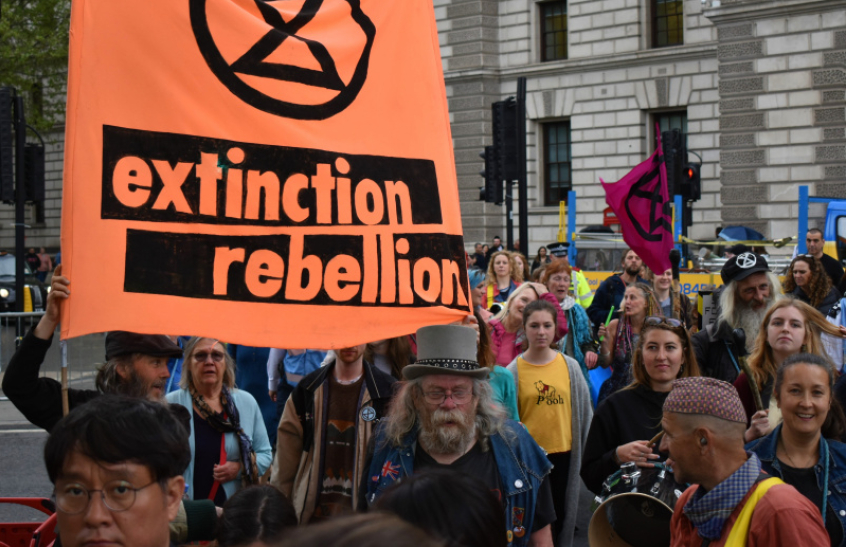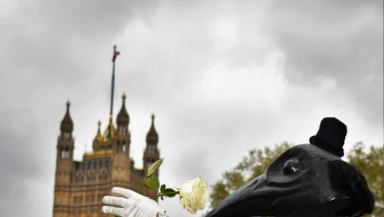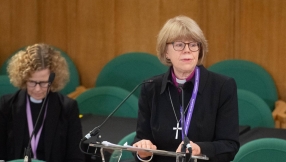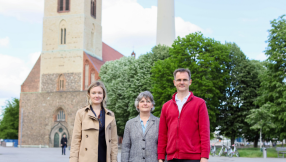
There aren't many places in the world where you can encounter both a leading figure from Star Wars and a prominent Parliamentarian in quick succession.
But in London you can. Wandering through the capital a few days ago, we saw a street artist dressed as Yoda create the illusion that he was levitating above the pavement. And we also saw Labour MP Diane Abbott, the Shadow Home Secretary, addressing the Extinction Rebellion climate demonstrators as the protest neared its end.
It was hard to say which was the more surreal sight, given that a protestor dressed as a medieval Plague Doctor (think full-body black bird costume, beak and all, plus a small top hat) was gesticulating behind Ms Abbott as she spoke.
However, leaving aside its more carnivalesque aspects, how might a Christian reflect on Extinction Rebellion, now that this latest phase of its protest has come to an end?
Here are three thoughts to ponder:
Firstly, we should recognise the overwhelming consensus about climate change, especially if we have yet to do so.
The American space agency NASA states: "Multiple studies published in peer-reviewed scientific journals show that 97 per cent or more of actively publishing climate scientists agree: climate-warming trends over the past century are extremely likely due to human activities."
The NASA article then goes on to list some of the scientific societies, science academies, government agencies and inter-governmental bodies that have made statements in line with that consensus. The myth among some (especially American Republicans) that there is not near-unanimity on this issue is remarkable, but nonetheless readily debunkable once evidence is presented.
Christian organisations such as Tearfund, A Rocha, the John Ray Initiative (JRI), the Evangelical Alliance, Christian Aid and the Faraday Institute for Science and Religion all accept the reality of global warming caused by human activity. And as of February 2019, 194 states, plus the European Union as a bloc, have signed the Paris Climate Change Agreement.
The only non-signatory seems to be the Vatican, which cannot yet sign for technical reasons, but intends to.
The consensus is indisputable. Only the US, under the influence of Donald Trump, has said it wants to withdraw.
Secondly, we should wake up to the fact that Christian campaigning about climate change is a natural outworking of our faith. Just as 19th century British Christians spoke out and took action against the slave trade, so should we do likewise with this modern-day equivalent.

As an Evangelical Alliance article has stated: "Climate change could push more than 100 million people back into poverty by 2030 if we don't do something about it... Loving our poorest neighbours involves us caring about the environment and our climate change."
And Sir John Houghton, who was involved at a senior level with the International Panel on Climate Change, writes: "Our failure to be good stewards is a failure to love God and a failure to love our neighbours."
But, thirdly, we also have to ask: were the Extinction Rebellion protests the best way of furthering this cause?
I have a lot of sympathy with the passion of the participants, and their willingness to take a stand. I silently cheered when Ruth Valerio of Tearfund wrote on Twitter: "So I get the questions around [Extinction Rebellion] but we need large-scale societal change & for that we need agitators as well as reformers."
She joined the protest for part of the Easter weekend.
At the same time, it scarcely seems to be 'loving your neighbour' in practice for demonstrators to cause the widespread disruption that they did, barricading roads and bridges. That's not to mention the toll on the hard-pressed police force over a family Bank Holiday period for many officers.
Sadiq Khan, Mayor of London, had a point when he tweeted: "I support the passion about tackling climate change of those protesting, but... this is counter-productive to the cause and to our city."
Law enforcement resources were being drained away from tackling violent crime, he argued.
It's a tough call. At the end of the day we have to be very shrewd about when and how we as believers engage in civil disobedience.
The Christian political scientist David Koyzis has written some helpful guidelines on thinking this through and concludes: "Civil disobedience is our very last resort, to be contemplated only with fear and trembling. But by no means can faithful believers rule it out of bounds."
Was it justified on this occasion? It seems to me on balance not. But such would be the effect of unchecked climate change on the planet, especially its poorest and most vulnerable, that I would be open to being persuaded...
David Baker is a former daily newspaper journalist now working as an Anglican minister in Sussex, England. Find him on Twitter @Baker_David_A













